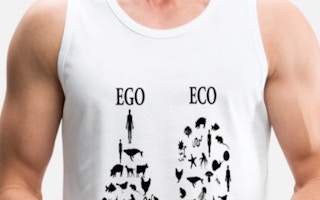As a journalist covering this beat since 2016, I get the sense that ego and the pursuit of recognition are a growing presence in the sustainability community in Asia Pacific.
To continue reading, subscribe to Eco‑Business.
There's something for everyone. We offer a range of subscription plans.
- Access our stories and receive our Insights Weekly newsletter with the free EB Member plan.
- Unlock unlimited access to our content and archive with EB Circle.
- Publish your content with EB Premium.
There’s the rising expectation of coverage for sustainability initiatives from contacts (“I’ve just launched Asia’s first green loan, so you must write about it…”).
The relentless pursuit of awards.
The falsely-modest social media posts declaring how “humbled” or “privileged” so and so was to have spoken at a conference.
All of this can give the impression that some sustainability folk are more bothered about their own image than doing their bit to save the planet.
Of course, egotistical executives are pervasive across all industries. But is it more harmful to the cause in sustainability, which is supposedly a vocation, a calling, like teaching or nursing? And what kind of personal standards should you be held to as a sustainability officer?
Late last year, a waste reduction expert I approached for an interview would not give me a quote unless I mentioned his numerous achievements in the story. It was as if sharing his expertise on how to fight the plastic crisis in Southeast Asia was less important than his profile.
But does the ego that is seeping into the sustainability world in this region really matter, as long as the more image-conscious among us are doing a good job of making business less harmful to people and planet?
“
The best [sustainability professionals] I have known … have been driven and determined and, yes, generally ‘big’ personalities. It goes with the territory.
Anita Neville, senior vice president, group corporate communications, Golden Agri-Resources
Possibly, yes.
One problem with ego in sustainability, according to an executive who works for one of the world’s biggest consumer goods giants, is that the holier-than-thou smugness often associated with people who work in the field is a turn-off to those who don’t care about the issues as much as (supposedly) we do.
It’s counter productive, and plays into the hands of climate deniers, cynics and refuseniks who—rightly so, perhaps—see ego in sustainability professionals as a form of hypocrisy.
Ok, you’re saving the world. But do you need to expend such resources showing off about it?
Lahiru Wijedasa, a scientist at urban sustainability institute Singapore-ETH Centre, said that the critical thing about sustainability is to persuade people to think more about an issue, and if you’ve got a big ego it’s harder for people to relate to you, and what you have to say about better ways of doing business.
Mikkel Larsen, the chief sustainability officer of DBS Bank, would agree. He told Eco-Business for our story on what makes a great sustainability leader that his role does not give him the moral high ground over colleagues in the more hard-nosed functions of the bank, like accounting or sales.
Humility, particularly in Asia where it is a more prized trait than in the chest-thumping West, is more likely to get a sustainability strategy followed by employees, not all of whom will be convinced of the value of a function that is often seen as a cost and not a benefit to a business, Larsen suggested.
People who are in sustainability for self-glorification will be limited in how effective they can be, particularly at bringing different groups of people to work together, said Moray McLeish, vice president of corporate responsibility and sustainability at agribusiness firm Olam, which works with environmental groups such as Wildlife Conservation Society on the sustainability of the coffee industry in Indonesia.
“Ego and genuine stakeholder collaboration are not good bedfellows,” he told Eco-Business. “The narcissist is likely to be rejected or sidelined by the ‘genuine’ sustainability community sooner or later.”
Humility might not come naturally to the many people who are entering the sector, other sources suggest.
Energy is the perhaps the best example of a sector now flooded with former oil and gas executives evangelising sustainability as they launch renewable energy businesses in Asia. Does it really matter if their chest-beating is somewhat hypocritical if they are moving the needle towards a clean energy future?
Is recognition key to impact?
Esther An, the chief sustainability officer of City Developments Limited, one of Singapore’s more progressive property firms that features regularly in sustainability rankings such as the Corporate Knights Global 100, said that practitioners who are in the field for their own personal glory will not likely win the trust of stakeholders over the long term.
However, she added that sustainability executives are under increasing pressure to prove that the integration of environmental, social and governance (ESG) issues has a strong business case. “Active communication to raise the profile of the company is a deliverable that justifies the investment [in sustainability],” she said.
Awards and accolades are not meant to boost the ego of practitioners, but they are important ways to affirm that a strategy is working, said An, who spoke at more than 80 events around the region last year (she carbon offsets her flights).
“With our 25 years’ experience in ESG integration, winning recognition comes with the job,” she said.
Like the irrepressible An, Anita Neville, the senior vice president of group corporate communications at palm oil firm Golden Agri-Resources, is no shrinking violet. The former World Wide Fund for Nature (WWF) and Rainforest Alliance executive, said that sustainability professionals cannot afford to be “wall-flowers”.
“The best [sustainability professionals] I have known and worked with have shared similar traits – passion for what’s possible combined with a continual sense of dissatisfaction with performance. They have been driven and determined and, yes, generally ‘big’ personalities in some way, shape or form. I think it goes with the territory.”
The work of a sustainability executive is difficult in a business that is focused on the bottom line, and practitioners are often “pushing molasses up a hill,” she said.
“Rewards, and awards, are generally pursued to help that internal process. Bosses like to be winning – commercially as well as on the public stage,” said Neville, whose company featured in the Dow Jones Sustainability Indices for the first time in 2017 and has won numerous sustainability reporting awards.
Benjamin Lephilibert, managing director of Bangkok-based LightBlue Environmental Consulting, said that he regrets not having been bolder when he first started his food waste consultancy business in 2012.
“I think I could have collaborated earlier and achieved more if I’d been more upfront,” he said. “Ego can sometimes be your best ally, because you’re taking hits constantly, especially when don’t have a huge network, finance or venture capital behind you.”
Hailin Pek, director of Singapore-based green group Zero Waste Singapore, is a well-liked and characteristically pragmatic Singaporean activist. But she said that more people with egos in sustainability “might be unavoidable” as the field expands in this part of the world.
This, she said, might be a “good problem”, since all hands on deck are needed to fix big sustainability problems.
Benjamin Tay, the head of Singaporean non-profit People’s Movement to Stop Haze (PM.Haze), agreed. But he said that if a practioner is interested in raising their profile through their work, they should be measured by their outcomes.
His public appearances are worthwhile, he added, only if they lead to increased exposure and donations for his organisation.
The trust factor
As in all walks of business, there is a spectrum of people who work in sustainability. And Karen Sim, senior sustainability strategist with non-profit Forum for the Future, said there’s no wrong in sustainability practioners pursuing recognition while doing a good job.
“Keeping the world within 1.5 degrees of warming is going to take the support of everyone on this spectrum,” said Sim, who was one of the speakers at Singapore’s Climate Rally last year.
Elon Musk, the inimitable head of disruptive renewables firm Telsa, has drawn the man on the street into the discussion about the energy transition through the weight of his personality as well as his voracious intellect and talent, she argued.
“Sometimes, successful people have big egos,” she said.
“But if you ask me who I would trust and ‘follow’ as a leader, it would surely be one who is less ego and more heart than someone who is equally successful but craves recognition,” said Sim.
As sustainability grows in Asia Pacific, and more people and capital shift into the sector, it is inevitable that more egos do too. Let’s just hope that those egos are put to good use: making business better for people and the planet.











